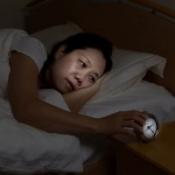 Maybe you’ve been struggling with anxiety and panic and you’ve tried everything: medication, progressive relaxation, meditation, exercise, deep breathing, herbs, watching TV till your eyes glaze over in a stuporous fog—and still you’re feeling nervous, irritable, unable to focus, panicky, and tense.
Maybe you’ve been struggling with anxiety and panic and you’ve tried everything: medication, progressive relaxation, meditation, exercise, deep breathing, herbs, watching TV till your eyes glaze over in a stuporous fog—and still you’re feeling nervous, irritable, unable to focus, panicky, and tense.
What you’re missing might surprise you: you could be suffering from lack of sleep.
Studies show sleep deprivation to be one of the primary contributors to anxiety problems, depression, and other psychiatric disorders. Sleep appears to be very important for emotional regulation and processing.
At University of California Berkeley’s Sleep and Neuroimaging Laboratory, assistant professor Matthew Walker’s experiment with sleep deprivation in humans showed that without sleep, the brain reverts back to more primitive patterns of activity. People then become less able to put emotional events into context and respond appropriately.
The amygdala is the part of the brain that prepares the body to protect itself when it perceives danger. When it senses danger, it sends a message to the prefrontal cortex, which then interprets and assesses the situation and decides whether to activate the fight or flight response. Under normal circumstances, the amygdala and prefrontal cortex work together to respond appropriately to danger while also keeping people from overreacting to emotional experiences. Under conditions of sleep deprivation, subjects’ amygdales and prefrontal cortexes stopped working together. Emotional centers were 60% more active, resulting in slower reflexes, increased irritation, problems with focus and concentration, and higher feelings of anxiety.
Other studies suggest that lack of REM sleep causes or worsens psychological problems. REM sleep, also known as dreaming sleep, is very important for processing emotions and memories, clearing the mind of the stressful events of the day, and dreaming. During this stage of sleep, the areas of the brain used in learning and developing new skills are stimulated. About 70 to 90 minutes after falling asleep, the first REM cycle occurs; ideally, people will have three to five REM episodes per night. Getting more and better REM sleep has been shown to boost people’s moods during the day. Fortunately, improving the quantity and quality of REM sleep you get is relatively easy.
Many experts recommend getting seven to nine hours of sleep per night, although some say that the quality of sleep is more important than quantity. Getting six hours of high-quality, uninterrupted sleep is more beneficial than eight hours of restless, interrupted sleep. You can immediately improve the quality of your sleep by making two important changes: change what you put into your body and what you do with your body, both during the day and when getting ready for sleep.
Change What You Put into Your Body
- Eating, drinking, and medication habits may be disrupting your sleep more than you think. Too much food, especially rich, fatty food, can keep your stomach working overtime to digest, and spicy food can cause heartburn. Too much liquid can cause numerous trips to the bathroom at night. Your first step to better sleep is to limit your intake of rich, fatty, or spicy food, especially during your evening meal. Stop eating and drinking fluids several hours before you go to bed for the night.
- Alcohol and caffeine use can also be very disruptive to your sleep cycle. Although you may feel temporarily relaxed after using alcohol, it causes you to wake up later at night, interrupting deep sleep and REM sleep. Caffeine can disturb sleep for up to ten to twelve hours after ingestion, so cut out the caffeine after lunchtime. Nicotine is another stimulant which disrupts sleep, so cut down or eliminate smoking to improve your sleep—although if you’ve been a smoker for a while, nicotine withdrawal may temporarily make it harder for you to sleep.
Change What You Do with Your Body
- Regular exercise can help you fall asleep easier and achieve better rest. It doesn’t even have to be intense or rigorous: a brisk walk or bike ride is plenty. As little as twenty or thirty minutes per day of moderate exercise can be very helpful, and you can even break your activity up into ten- or fifteen-minute segments if you wish. You will want to schedule your exercise in the morning or early afternoon, because your body needs sufficient cool-down time to sleep well.
- Set up a consistent, relaxing routine before bed. This trains your brain to recognize that it is time to wind down, making it easier for you to fall asleep. For thirty minutes to an hour before bed, find peaceful, quiet things to do to relax your body and mind. You might try things such as reading a light, entertaining book or magazine, listening to soft music or audiobooks, enjoying a hobby such as knitting or doing puzzles, or making simple preparations for the next day. A cup of hot tea or a glass of warm milk can also be helpful.
- Although many people use watching TV as a way to relax or fall asleep, television actually stimulates your brain rather than relaxing it. Watching disturbing, violent material on the news or prime-time shows stimulates thinking as well as your physiology. Even if you do manage to fall asleep with the TV on, the continuous flickering of the screen can interfere with your body’s clock, which is sensitive to any light. You will get higher-quality sleep with the TV and computer off. If you have a hard time getting used to sleeping without the television, try turning on soft music, a sleep sound maker, or a fan.
- Avoid napping during the day, which interferes with your body’s clock. Set up your nightly relaxation routine and stick to a consistent sleep schedule, and your quality of sleep will improve.
Getting adequate, quality sleep is extremely important for emotional regulation and processing. Fortunately, it is relatively easy to make changes in this area. Start today, and the effects can be felt almost immediately.
Reference:
- Yoo, S., Gujar, N., Hu, P., Jolesz, F.A., Walker, M.P. (2007) The human emotional brain without sleep: A prefrontal amygdala disconnect. Current Biology 17: 877-878

The preceding article was solely written by the author named above. Any views and opinions expressed are not necessarily shared by GoodTherapy.org. Questions or concerns about the preceding article can be directed to the author or posted as a comment below.

 Sleep Your Anxiety Away, Part II: 'But My Anxiety Is Keeping Me Awake!'
Sleep Your Anxiety Away, Part II: 'But My Anxiety Is Keeping Me Awake!' Strategies to Get to Sleep When Life Is Keeping You Awake
Strategies to Get to Sleep When Life Is Keeping You Awake Techniques for Coping with Generalized Anxiety
Techniques for Coping with Generalized Anxiety

Please fill out all required fields to submit your message.
Invalid Email Address.
Please confirm that you are human.
Leave a Comment
By commenting you acknowledge acceptance of GoodTherapy.org's Terms and Conditions of Use.